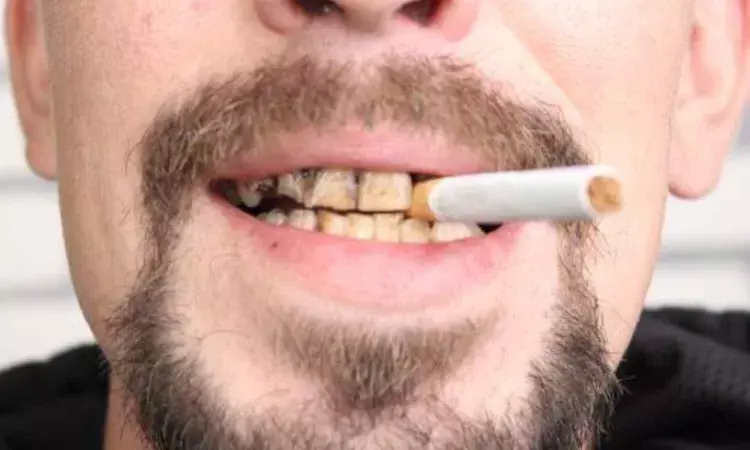- Home
- Medical news & Guidelines
- Anesthesiology
- Cardiology and CTVS
- Critical Care
- Dentistry
- Dermatology
- Diabetes and Endocrinology
- ENT
- Gastroenterology
- Medicine
- Nephrology
- Neurology
- Obstretics-Gynaecology
- Oncology
- Ophthalmology
- Orthopaedics
- Pediatrics-Neonatology
- Psychiatry
- Pulmonology
- Radiology
- Surgery
- Urology
- Laboratory Medicine
- Diet
- Nursing
- Paramedical
- Physiotherapy
- Health news
- Fact Check
- Bone Health Fact Check
- Brain Health Fact Check
- Cancer Related Fact Check
- Child Care Fact Check
- Dental and oral health fact check
- Diabetes and metabolic health fact check
- Diet and Nutrition Fact Check
- Eye and ENT Care Fact Check
- Fitness fact check
- Gut health fact check
- Heart health fact check
- Kidney health fact check
- Medical education fact check
- Men's health fact check
- Respiratory fact check
- Skin and hair care fact check
- Vaccine and Immunization fact check
- Women's health fact check
- AYUSH
- State News
- Andaman and Nicobar Islands
- Andhra Pradesh
- Arunachal Pradesh
- Assam
- Bihar
- Chandigarh
- Chattisgarh
- Dadra and Nagar Haveli
- Daman and Diu
- Delhi
- Goa
- Gujarat
- Haryana
- Himachal Pradesh
- Jammu & Kashmir
- Jharkhand
- Karnataka
- Kerala
- Ladakh
- Lakshadweep
- Madhya Pradesh
- Maharashtra
- Manipur
- Meghalaya
- Mizoram
- Nagaland
- Odisha
- Puducherry
- Punjab
- Rajasthan
- Sikkim
- Tamil Nadu
- Telangana
- Tripura
- Uttar Pradesh
- Uttrakhand
- West Bengal
- Medical Education
- Industry
Frequent recreational cannabis use associated with caries and tooth loss, suggests study

Frequent recreational cannabis use associated with caries and tooth loss, suggests a study published in the Journal of the American Dental Association.
This study aimed to examine the association of frequent recreational cannabis (FRC) use with untreated coronal caries, untreated root surface caries, and severe tooth loss.
This cross-sectional study analyzed data obtained from 5,656 people, aged 18 through 59 years, who participated in the National Health and Nutrition Examination Survey from 2015 through 2018. FRC use was defined as self-reported use of marijuana or hashish at least once per month for the past 12 months.
Log-binomial and logistic regression analyses were conducted before and after controlling for sociodemographic and behavioral factors to examine the association between FRC use and untreated coronal caries, root surface caries, and severe tooth loss. Results: Compared with non–FRC users, people reporting FRC use had 17% higher probabilities of having untreated coronal caries (95% CI, 1.02 to 1.35), 55% higher odds of having untreated root surface caries (95% CI, 1.21 to 1.99), and 41% higher odds of having severe tooth loss (95% CI, 1.00 to 1.99) after controlling for age, sex, race or ethnicity, nativity, education, family income to poverty ratio, and alcohol consumption.
This study suggests that FRC use is associated with increased coronal caries, root surface caries, and severe tooth loss in the US adult population. Further longitudinal studies are warranted to assess the impact of varying frequencies, quantities, and forms of cannabis use. Dental care professionals should be aware that FRC use may be associated with caries and tooth loss.
Frequent recreational cannabis use and its association with caries and severe tooth loss Clonan, Ellyce et al. The Journal of the American Dental Association, Volume 0, Issue 0
Dr. Shravani Dali has completed her BDS from Pravara institute of medical sciences, loni. Following which she extensively worked in the healthcare sector for 2+ years. She has been actively involved in writing blogs in field of health and wellness. Currently she is pursuing her Masters of public health-health administration from Tata institute of social sciences. She can be contacted at editorial@medicaldialogues.in.
Dr Kamal Kant Kohli-MBBS, DTCD- a chest specialist with more than 30 years of practice and a flair for writing clinical articles, Dr Kamal Kant Kohli joined Medical Dialogues as a Chief Editor of Medical News. Besides writing articles, as an editor, he proofreads and verifies all the medical content published on Medical Dialogues including those coming from journals, studies,medical conferences,guidelines etc. Email: drkohli@medicaldialogues.in. Contact no. 011-43720751


